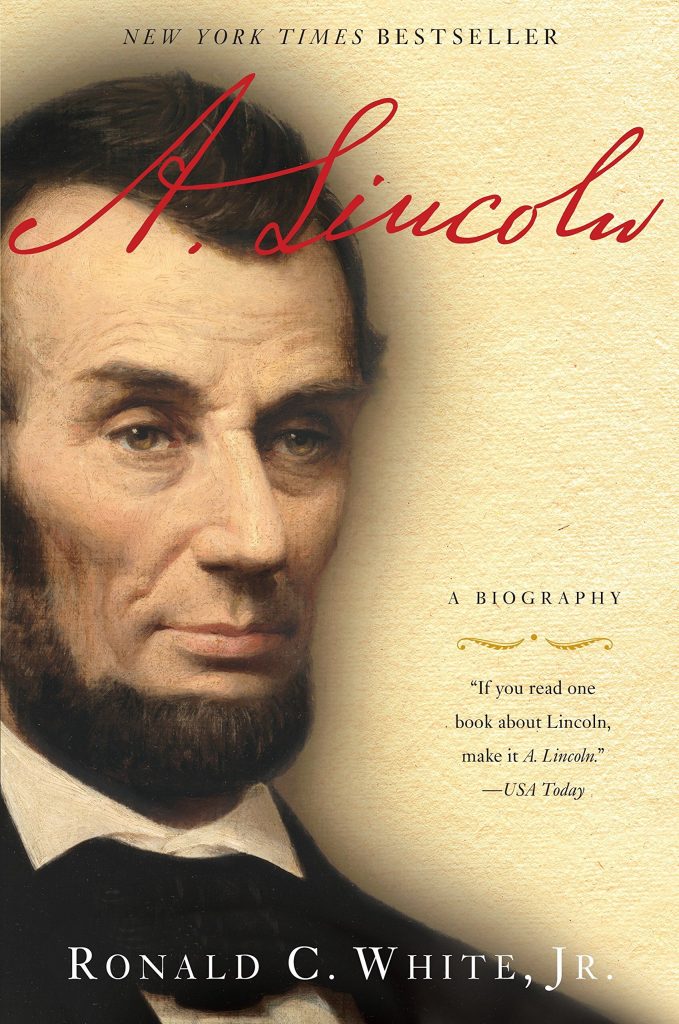Superb!


In telling the story of A. Lincoln, Ronald C White, (Jr!) has given us a beautifully drawn if rather reverential rendering of a fascinating man. A man whose life manages to be almost prismatic, telescoping hundreds of years of cultural history into one short lifespan. A lifespan tragically shortened, at that.
The story begins with roots: Lincoln himself, though fascinated by his family history, was unable to trace it back far, and saw himself as descended from ‘undistinguished’ stock. White’s fuller picture reveals the Lincoln family odyssey, from fleeing England to seek religious and economic freedom, to Abe’s eventual sojourn in the Executive Mansion (as the Whitehouse was then known), to be a fascinating microcosm of the much larger American experience.
Lincoln’s limited rural childhood education didn’t stop this ambitious autodidact from achieving a dizzying ascent. His critics often chided him for his slow progress. But, as he himself said, though he walked slowly, he never walked backwards!
It’s perhaps a sad reflection of the political disillusionment of our times, but I’d generally actively avoid contemporary political biography, expecting it to be deadly dull. Lincoln’s path to power, via the worlds of law and politics, two fields of human endeavour which remain relatively obscure and cold to me, is, fortunately, sufficiently interesting to maintain our avid attention. And in his legal career seeds of Lincoln’s future presidential skills can be seen growing. The images that White conjures, of Lincoln riding the legal circuit, as a ‘Prairie Lawyer’, are also highly evocative.
As politics takes over from law we get a portrait not just of Lincoln the man, but of how American politics was itself evolving. Initially a Whig (whatever that is; one of the few quibbles I have with this book is that White doesn’t define this, assuming his readership will know*), Lincoln became a Republican. Rather strangely, to some modern readers, perhaps, the differences and similarities between Republicans and Democrats have evolved somewhat: in our time we’ve had a Democrat president of African American heritage; back in Lincoln’s days Republican ‘radicals’ were more frequently abolitionists, with Democrats more often the reactionary conservatives (or, to put it more bluntly, racists).
White skilfully tells the potentially dull tale of how Lincoln finally gets into power, not as the clear favourite, but at a time of muddled, fractious sectionalism, with enough verve to make it compelling. Once in power, it may surprise some readers – I think it surprised me – how cautiously Lincoln initially proceeded, clearly feeling his want of education and political office-holding experience. As he grows in experience in power, White shows Lincoln as becoming more confident of his own shrewd judgments: Lincoln’s inner moral compass – a pet theme of White’s – is already well developed. His faith that it will win the day takes time to grow.
Another favoured theme of White’s is Lincoln’s religious evolution (White has written other titles on more overtly religious subjects). I was fascinated by this aspect of the biography, despite coming at it – I’m guessing – from a really quite different perspective. Certainly it’s a very valid and important aspect of the portrait, Lincoln, like so many in America at that time (and even now, perhaps?), being thoroughly soused in a deeply Christian culture.
It could probably be argued – by those who know more on the subject than I do – that White’s portrait of Lincoln is perhaps hagiographic. Certainly it’s a work written by an author who clearly loves his subject. That might not be all good, in that it may contribute to an over-idealised portrait. But from the viewpoint of supplying a cracking good read, the author’s passion for his subject is a clear boon.
I come to this primarily via an interest in the ACW (American Civil War). As a prime player in that epic drama, one can’t help but be drawn to Lincoln’s part in it all. Seeing Spielberg’s Lincoln only added to the desire to know more. First I bought a slim Penguin volume, which I can recommend, which collates some of Lincoln’s famously sonorous and memorable speeches and letters, etc. Good as that is, the hunger for more and deeper knowledge of this fascinating man ultimately lead me here.
And I’m glad it did. This is an excellent book, about an uncommonly inspiring man. Lincoln’s facility with language and ideas is remarkable. And one of his many attractive qualities, both as lawyer and politician, and that despite presiding over a terrible civil war (assuredly not of his making), is his sagaciously conciliatory approach. Napoleon was said to have had great charisma. Lincoln appears to have had it also. But of an entirely different sort. One quickly loses count of the number of times one reads in this book of people coming to Lincoln, dead set against him, and seeking to alter both his outward course and inner mind – they arrive contentious, as enemies – only to depart with their minds changed, as admirers.
I found this book fascinating, informative, occasionally thrilling, and often – esp. when reading Lincoln’s masterfully crafted words – moving. A study of Lincoln’s life and times remains salutary. And I’m grateful to White for supplying us with a highly readable account of an inspiring American president.
* And in case you don’t know either, here’s Wikipedia’s definition: Whiggism.
